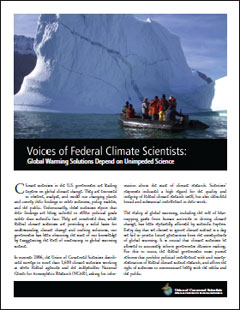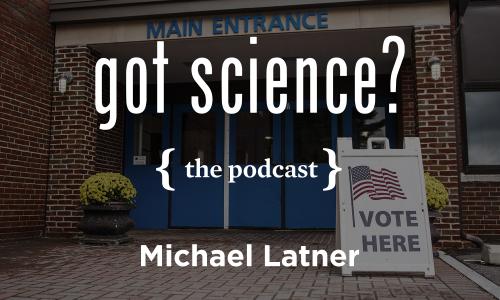Climate scientists in the U.S. government are the world's leading experts on global climate change. They are entrusted to observe, analyze, and model our changing planet and convey their findings to other scientists, policy makers, and the public. Unfortunately, scientists report that their findings are being tailored to reflect political goals rather than scientific fact. They are concerned that, while federal climate scientists are providing a solid basis for understanding climate change and crafting solutions, our government has been obscuring the state of our knowledge by exaggerating the level of uncertainty in global warming science.
In the summer of 2006, the Union of Concerned Scientists distributed surveys to more than 1,600 climate scientists working at seven federal agencies and the independent National Center for Atmospheric Research (NCAR), asking for information about the state of climate research at federal agencies. Scientists' responses indicated a high regard for the quality and integrity of federal climate research itself, but also identified broad and substantial interference in their work.
The reality of global warming, including the role of heat-trapping gases from human activities in driving climate change, has been repeatedly affirmed by scientific experts. Every day the government stifles climate science is a day we fail to protect future generations from the consequences of global warming. It is crucial that climate scientists be allowed to accurately inform government decisions. For this to occur, the federal government must pursue reforms that prohibit political interference and misrepresentation of federal climate science research, and affirm the right of scientists to communicate freely with the media and the public.
I. Political interference with climate science
Large numbers of federal climate scientists reported various types of interference, both subtle and explicit:
- 73 percent of all respondents* perceived inappropriate interference with climate science research in the past five years.
- 58 percent of all respondents personally experienced interference with climate science research in the past five years. This number increased to 78 percent among scientists whose work always or frequently touches upon sensitive or controversial topics. In contrast, only 22 percent of NCAR scientists personally experienced interference with climate science research.
- Nearly half of all respondents (46 percent) perceived or personally experienced pressure to eliminate the words "climate change," "global warming," or other similar terms from a variety of communications. This number increased to nearly three in five (58 percent) among respondents from the National Oceanic and Atmospheric Administration (NOAA).
- 46 percent of all respondents perceived or personally experienced new or unusual administrative requirements that impair climate related work.
II. Scientific findings misrepresented
Federal climate scientists reported that their research findings have been changed by non-scientists in ways that compromise accuracy:
- Two in five respondents (43 percent) perceived or personally experienced changes or edits to documents during review processes that changed the meaning of scientific findings.
- 25 percent perceived or personally experienced situations in which scientists have actively objected to, resigned from, or removed themselves from a project because of pressure to change scientific findings.
- 37 percent of respondents perceived or personally experienced instances in which their agency misrepresented scientists' findings.
III. Barriers to communication
Agency scientists are not free to communicate their research findings to the media or the public:
- 52 percent of respondents said their agency's public affairs officials always or frequently monitor scientists' communications with the media. In contrast, only seven percent of NCAR respondents reported that same level of monitoring.
- Two in five respondents (39 percent) have perceived or personally experienced "fear of retaliation for openly expressing concerns about climate change outside their agency."
- 38 percent of respondents perceived or personally experienced "disappearance or unusual delay of websites, reports, or other science-based materials relating to climate."
- A majority of NASA respondents (61 percent) agreed with the statement, "Recent changes to policies pertaining to scientific openness at my agency have improved the environment for climate research," in sharp contrast to the 12 percent of non-NASA respondents who agreed with the statement. The high percentage among NASA respondents is most likely the result of a recent policy implemented at the agency that affirmed that the role of public affairs officers was not "to alter, filter or adjust engineering or scientific material produced by NASA's technical staff."
IV. Climate scientists are disheartened
While a large majority of respondents (88 percent) agreed with the statement, "U.S. federal government climate research is of generally excellent quality," respondents reported decreasing job satisfaction and a worsening environment for climate science in federal agencies:
- Two-thirds of respondents said that today's environment for federal government climate research is worse compared to five years ago (67 percent) and 10 years ago (64 percent). Among scientists at NASA, these numbers were nearly four in five (79 percent and 77 percent, respectively).
- 45 percent of all respondents said that their personal job satisfaction has decreased over the past few years. At NASA, three in five (61 percent) reported decreased job satisfaction.
- More than a third of respondents from NASA, and more than one in five (22 percent) of all respondents, reported that morale in their office was "poor" or "extremely poor." Among NCAR respondents, only seven percent reported such low levels of morale.
- Insufficient resources are a source of concern among respondents. More than half (53 percent) disagreed with the statement, "The U.S. government has done a good job funding climate research."
Survey demographics
Surveys were sent to 1,630 scientists at the National Aeronautics and Space Administration, National Oceanic and Atmospheric Administration, U.S. Environmental Protection Agency, U.S. Department of Energy, U.S. Department of Defense, U.S. Geological Survey, U.S. Department of Agriculture, and the independent (non-federal) National Center for Atmospheric Research (NCAR).
Responses came from 279 federal scientists and 29 NCAR scientists. One hundred forty-four scientists provided narrative responses. The response rate (19 percent) was fairly consistent across agencies. Eighty percent of the scientists who responded had earned a Ph.D. and 40 percent had completed some post-doctoral research work. A significant number of respondents (44 percent) had been with their agency for more than 15 years, and more than half had been there for more than 10 years.
*Unless otherwise stated, the numbers cited in this report reflect only the responses of federal climate scientists, and do not include the responses from NCAR scientists (who are not federal employees).




